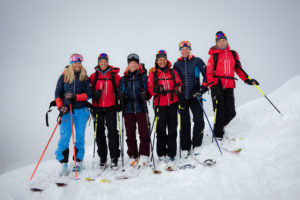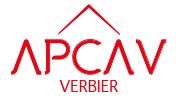
The Alpine Quest team with Loubna Freih (3rd from the right) and Sophie Pelka (5th from the right)
This week, the APCAV interviews one of its members, Loubna Freih, who plans to traverse the Alps from Vienna to Monaco.
Loubna, can you tell us about your Alpine Quest 2025 project?
Alpine Quest 2025 is the result of a dream—to cross the entire Alps, from Austria to Monaco on skis—and a realization: this is no longer feasible due to climate change and its unpredictability. As a triathlete, I envisioned a solution by combining three modes of transportation in this order: cycling, ski mountaineering, and running.
The journey will begin by bike from Vienna on March 1st. We will then climb, if conditions allow, the Grossglockner, Austria’s highest peak, and continue skiing across the Austrian and Swiss Alps. We will enter Switzerland through Graubünden, pass through Airolo and Zermatt (we plan to climb the Dufourspitze if the weather and conditions permit), and traverse Verbier to Bourg-St-Pierre before reaching Courmayeur, Italy. From there, we will head south, crossing major mountain ranges and several national parks in France, ultimately finishing in Isola 2000 in the Alpes-Maritimes. From Isola 2000, the final stage will be on foot, heading to Monaco and entering the Principality.
How did you come up with this idea?
Sophie Pelka, an APCAV member, Mélanie Corthay, the first female guide from Val de Bagnes, and I have climbed numerous passes and peaks in the Alps since we began skiing together in 2017. I have always been fascinated by the idea of transitioning from one mountain range to another. I love big challenges, and, in addition, we can raise awareness and take action to draw attention to climate change’s effects on glaciers and water resources.
You mentioned that this project is not just about accomplishing a sporting feat by crossing the mountains but also aims to draw attention to the role of glaciers. What kind of impact do you hope to achieve through your efforts?
Although we’ve heard about glacier melting for years, it’s hard to fully grasp the direct impact this will have on many affected communities—and on us, who enjoy a privileged situation. Here are a few examples: between 60% and 80% of Europe’s freshwater comes from the glaciers of the Alpine arc. The Alps, considered the continent’s main water reservoir, are the source of major rivers such as the Rhône, the Rhine, the Po, and the Danube.
You’ll be joined by other women during your journey. Is there also a message you wish to convey through this choice? If so, what is it?
Along with Sophie and Mélanie, I will be joined by a dozen athletes and women of all ages and backgrounds who practice various sports. Together, we want to highlight the strength and resilience of women in the mountains, as well as their spirit of solidarity and their commitment to passing on to younger generations the beauty and respect for the mountains we all cherish. We will provide educational materials about the Alps, their mountains, and their glaciers for schools in Val de Bagnes and beyond. These schools will also be able to follow our initiative via a digital platform. It’s a private endeavor, certainly, but one entirely dedicated to education and awareness.
You are a member of APCAV, and several members of the Alpine Quest team reside in Val de Bagnes. Can you tell us about your connection to this region and your hopes as an athlete, woman, and independent professional in coaching regarding the development of Verbier and the surrounding municipality?
Since my childhood, Verbier has always held a special place in my life. This is where I learned to ski, as did my children, who also attended school in Verbier. Our family’s bond with this region runs deep. In the face of climate change and the disruptions in precipitation cycles that we’re already witnessing in the Alps, it’s crucial that Verbier and the municipality integrate these environmental challenges into their development—not only socially but also economically. A long-term vision is essential: informing and educating future generations, anticipating necessary adaptations, and involving local communities and stakeholders in decision-making.
The official launch of the Alpine Quest 2025 adventure will take place in Verbier on January 25, 2025. If you’re interested in supporting the project, you can contact Loubna (loubna@loubnafreih.com) or Claire Wardle (clairewardle@me.com). You can follow them live and make donations on www.alpinequest.org. Instagram: alpinequest_2025 | LinkedIn: Alpine Quest 2025.
Interview conducted by Brigitte Borel, 19.01.2025
